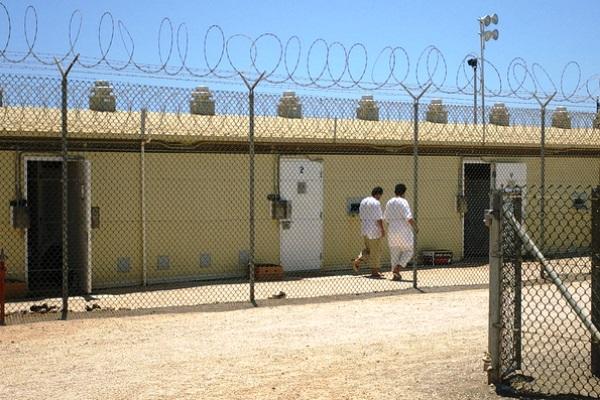Congressional opponents of President Obama's plan to relocate Guantanamo prisoners to the U.S. seized upon the crucial detail that was left out of the proposal Tuesday -- whose district or home state would get stuck with them and the political baggage they would bring?
Rep. Joe Heck, R-Nevada, chairman of the House Subcommittee on Military Personnel and a candidate for the Senate in Nevada, said in a statement that "another critical detail that is conspicuously missing from this plan is the location of the proposed new detention facility. That's a pretty significant detail to leave out."
At the Pentagon, Press Secretary Peter Cook said the choice on where to relocate the prisoners was up to Congress and deliberately left out of the plan developed by Defense Secretary Ashton Carter and recommended to Obama.
"We need the input of congress to be able to move forward. It's hard for us to present a final recommendation here" on location, Cook said.
In unveiling the plan, the Defense Department and the White House said that a total of 13 sites had been considered to house 30-60 of the remaining 91 Guantanamo detainees who could not be transferred to other countries or put on trial. Sites in Colorado, Kansas and South Carolina have been named, but the others have not been disclosed.
In his remarks, President Obama suggested that re-election politics and aspirations for higher office would play a part in how senators and representatives receive his plan for closing "Gitmo" and putting some of the prisoners somewhere in the U.S.
Speaking directly to members of Congress, Obama said that there initially was bipartisan support for closing Guantanamo early in his term but "what had previously been bipartisan support suddenly became a partisan issue. Suddenly, many of you (who) previously had said it should be closed backed off because they were worried about the politics."
Rep. Martha McSally, R-Arizona, essentially agreed, but said it was Obama who was playing politics by trying to fulfill a 2008 campaign pledge to close Guantanamo before he leaves office.
"Let's face it: This decision is about fulfilling a campaign promise, not strengthening our national security," said McSally, a retired Air Force colonel and member of the House Armed Services Committee (HASC).
In a statement, Rep. Mac Thornberry, R-Texas, the HASC chairman, said the U.S. location of the proposed facility was also one of his prime concerns. "I have pledged to give the president's plan a fair hearing, but he makes it impossible to do so when he withholds critical details," Thornberry said.
"Among the information missing is the proposed location for a new detention facility," Thornberry said. "More than seven years after he first ordered the detention center at (Guantanamo) closed, I find it telling that the White House has either failed to work out these important details or they know, but refuse to disclose them to the American public."
At a Pentagon news conference, Cook said that Carter deliberately left out a recommendation on where to put the facility from the plan he gave to President Obama. And he said there also were other sites for Congress to consider beyond the 13 whose locations have not been fully disclosed.
"This gives Congress a path to achieve the responsible closing" of Guantanamo, Cook said, and "we believe there are members of Congress who share the secretary's view, the president's view."
However, Cook said it would be "challenging" for Congress to act quickly enough to close Guantanamo before Obama leaves office. He also did not respond directly when asked if Obama might seek to bypass Congress with executive orders.
Earlier, senior administration officials, speaking on background, also skirted the question of executive orders. "Time is of the essence here," a senior official said, but "our focus today is on presenting this plan and using it to work with Congress to identify a path to changing current law and proceeding toward closure."
-- Richard Sisk can be reached at richard.sisk@military.com.




























